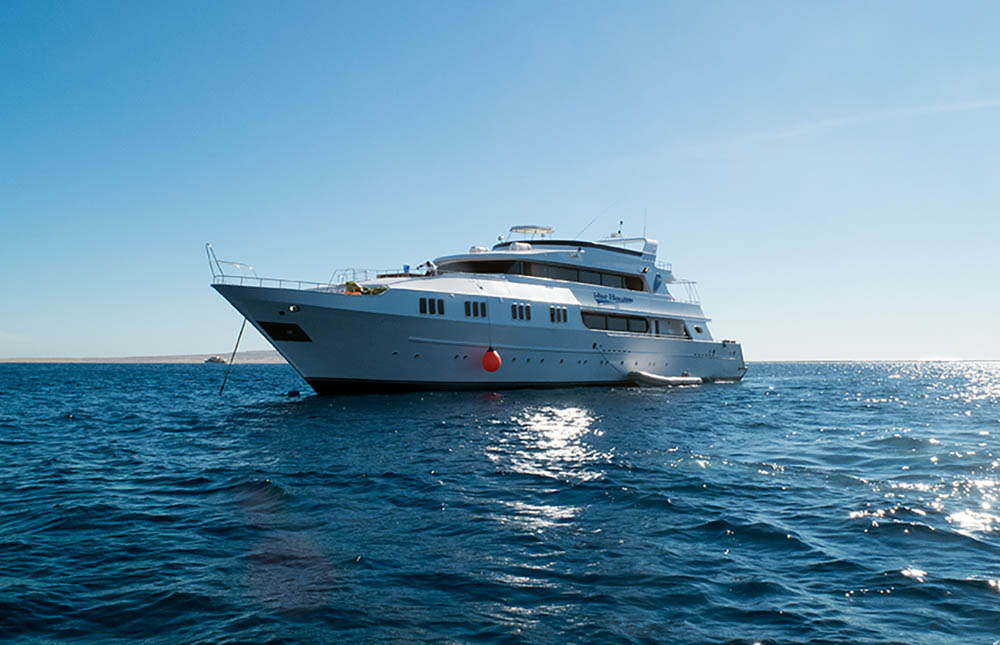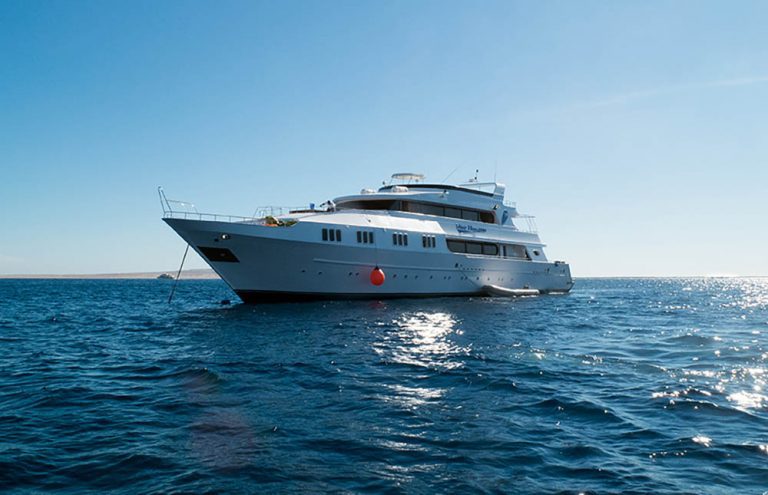Should I Stay… or Should I Go?
Ship or shore? Choosing a liveaboard or a land-based holiday is a decision worth agonising over, says RICHARD ASPINALL

THIS IS WHAT IT’S ALL BEEN FOR.You’ve spent hours on training, kit-selection and learning how to use a new camera, and every time your thoughts turn to diving and you imagine yourself in the clear blue waters of somewhere exotic – where in the world are you?
If destination is the first thought, for me the equally important question to ask is this: land-based or liveaboard?
Your answer will determine how you experience your chosen destination, how you interact with the local culture and how you access the dive-sites. It is fundamental to your holiday.
One of the strongest arguments for liveaboard diving, spending
a week or so living aboard a dive safari boat, is that you gain access to remote dive-sites that can’t easily be reached from land.
Take some Red Sea destinations such as the Brothers. These are liveaboard-only destinations: small, isolated islands in the middle of nowhere, often visited as part of a “Best of the Red Sea” itinerary with pristine corals and shark encounters on offer. No debate here.
Countless dive-sites around the world can be reached only by large-hulled boats. These often sail through the night, or take even longer, to reach remote archipelagos that give divers privileged access to reefs and wrecks.
In this scenario land-based or liveaboard is a moot point, as there is only one way to go.
Access to the best sites is a function of a safari-boat’s size and range, and anyone who has spent the early morning moored near and then diving the Thistlegorm from a liveaboard will admit to that slightly smug feeling that goes with having a wreck of that status to themselves before the day-boats arrive.
In this regard liveaboards win out for me, but what if you’re travelling with non-diving friends or family-members?
LIVEABOARDS IN MY BOOK are not the place for non-divers. In between the busy diving schedule, the boatful of divers talk about… diving. They read books about… diving, and watch The Blue Planet when they get bored of all the diving stories, anecdotes that often grow a little bit more elaborate after a few beers.
No, if you’re with a non-diver, land-based diving might well be best for you. You can enjoy a morning’s diving, then spend the rest of the day with those who have other interests.
The same goes, of course, if children form part of the group.
On a liveaboard you’re effectively confined, day after day, leaving the boat only to go under water. There’s no strolling along quiet beaches to watch the sun go down.
In this scenario, if you do want to get away from shore-based and local diving, signing up for an off-shore excursion becomes your best option.
You might have to get up early, of course, and you will almost certainly be on a smaller boat, so may need sea-sickness medication.
Appeared in DIVER December 2018
FOR THOSE DIVERS who want access to the very best sites, the liveaboards that deliver can do so at a significant upfront cost.
You need to calculate if it’s worth it, by considering the cost per dive. On a liveaboard, four dives a day is commonplace. Some locations don’t allow, or are unsuitable for, night-diving, in which case three day-dives could be the norm.
In between the diving, meals, soft drinks, and on occasion alcoholic beverages are all included. You know when you book your trip how much it will cost in total.
When you’re land-based, you might spend the same amount or more over the course of the week, as the temptations of a sunny resort and souvenir shops take their toll on your wallet.
How many of us come back from a holiday having spent way more than we anticipated? On a liveaboard, overspending is largely impossible.
So when you consider your entire spend, is a liveaboard better value? Will you spend less time bouncing up and down in a RIB? Will the diving be better? Will you have better bragging rights when you get back home and show everyone your shark photos?
Liveaboard diving has at its heart a certain contradiction: it can be amazingly easy, yet at the same time also be very intense and sometimes exhausting. Let me try to unpick this for you.
Liveaboard crews and dive-guides usually work very hard to give you the best experience possible.
When you appear from your cabin, bleary-eyed and in search of caffeine, the crew have often been awake and working for several hours to put you in the best location for an excellent dive.
You can literally fall off the back of the boat onto a world-class site after someone has helped you kit up and passed you your camera from the dive-deck.
This is liveaboard diving at its best. Yet doing this four times a day can leave some divers quite tired. I’ve often heard people say they’ll need a holiday when they get home.
The diving itself, away from the shore and perhaps on sites susceptible to current, can be demanding (it depends on location and fitness levels, of course).
It can also go beyond the physical. Sometimes on a dive rich with natural wonders – perhaps large numbers of mantas turn up, or you have an encounter with a pod of dolphins – you can be left emotionally charged and full of adrenaline. Liveaboard diving seems relaxing, but perhaps not in the way that you imagine.
I SHOULD OFFER another argument for shore-based diving here. There are many destinations from Indonesia to the Caribbean where you can leave your accommodation, collect your kit and a cylinder and walk down the beach for a dive.
Typically, these are house-reefs, and are a staple of destinations such as the Maldives.
For many, this is perfection – you decide how and when you dive. There might be dive-guides available and there will be safety guidelines to follow, but the sense of freedom that’s offered by this type of diving can be deeply attractive.
If you’re willing to spend an appreciable chunk of your salary on a dive-trip, you should expect some luxury, right?
In my experience liveaboards are getting better and better. The past 10 years has seen boats at best described as “serviceable” retired in favour of vessels with en-suite facilities and a TV in every cabin.
Perhaps more importantly, the quality of food on offer has risen as well, with international as well as local cuisine.
Liveaboards no longer mean roughing it, with operators offering incentives such as “free” nitrox to win your custom.
Making the land-based versus liveaboard decision takes a little thought: scrutinise itineraries, listen to first-hand accounts of fellow-divers and read around the subject.
Try not to make your decision on price alone. Liveaboard experiences can shape the way you dive for years to come. Choose wisely.

